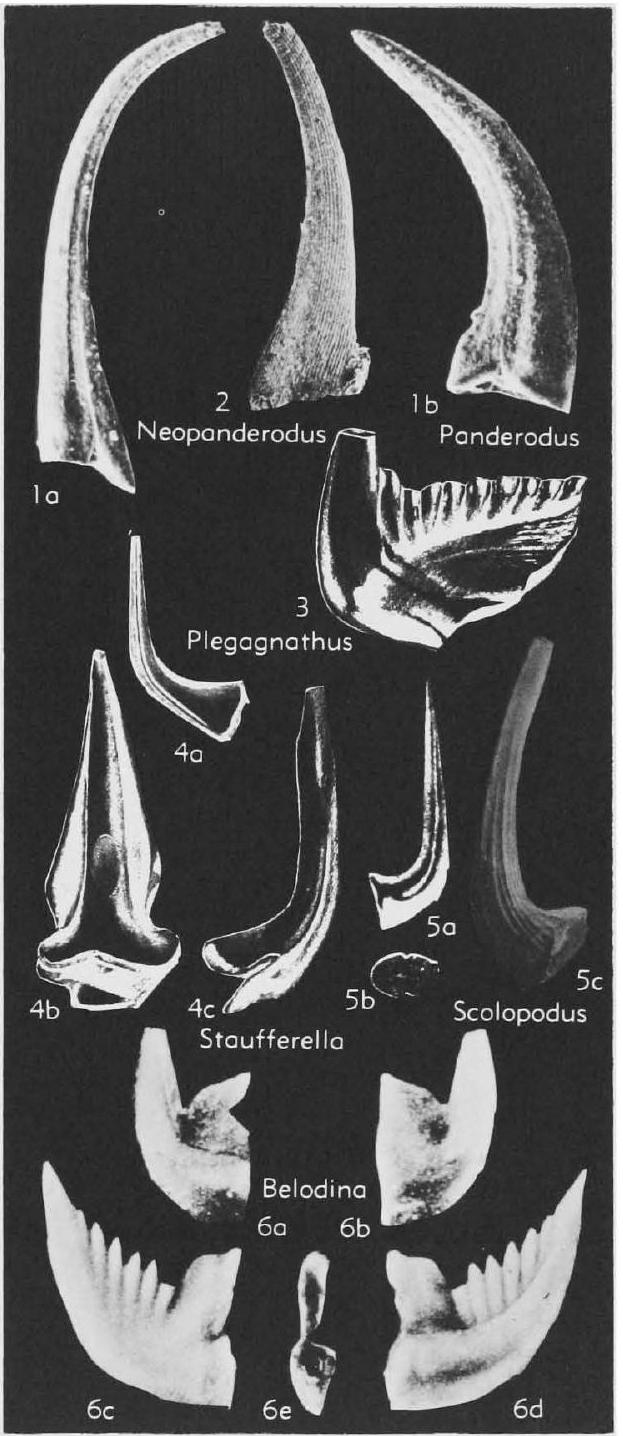Welcome to the Treatise on Invertebrate Paleontology!
Please enter a genera name to retrieve more information.

Scolopodus
Classification
Phylum:
Conodonta
Class:
Conodonta
Order:
Conodontophorida
Superfamily:
Panderodontacea
Family:
Scolopodontidae
Formal Genus Name and Reference:
Scolopodus PANDER, 1856, p. 25
Type Species:
S. sublaevis, SD Ulrich & BASSLER, 1926, p. 7
Images
(Click to enlarge in a new window)
FIG. 88,5a,b. *S. sublaevis, L.Ord., Eu. (Baltic); lat. view and cross section, magnification unknown (Pander, 1856).--FIG. 88,5c. S. rex LINDSTROM, L.Ord.(Didymograptus balticus Subzone), Eu.(Sweden); lat. view, X28 (Bergstrom, n).
Synonyms
Geographic Distribution
Eu.N.Am.-S.Am.-Asia.
Age Range
Beginning Stage in Treatise Usage:
L.Ord.
Beginning International Stage:
Tremadocian
Fraction Up In Beginning Stage:
0
Beginning Date:
486.85
Ending Stage in Treatise Usage:
M.Ord.
Ending International Stage:
Darriwilian
Fraction Up In Ending Stage:
100
Ending Date:
458.18
Description
Apparatus of type species unknown but apparently including an array of nongeniculate, dominantly hyaline, coniform elements with more or less circular cross section, small base, shallow basal cavity, and proclined to recurved cusp, sides of cusp in most species with numerous lateral costae arranged symmetrically or asymmetrically. [No find of the type species of the genus has been reported since PANDER'S time and, as discussed by LINDSTROM (I 971), there are problems in interpreting the morphology of this species; however, it seems obvious that 5. sttblaevis is morphologically close to, and congeneric with, the well-known species 5. rex LINDSTROM, 1955.]
References
Pander, C. H., 1856, Monographie der fossilen Fische des silurischen Systems der russischbaltischen Gouvernements: Akad. Wiss., St. Petersburg, 91 p., 1 text-fig., 7 pl .
Museum or Author Information
Classification
Phylum:
Conodonta
Class:
Conodonta
Order:
Conodontophorida
Superfamily:
Panderodontacea
Family:
Scolopodontidae
Formal Genus Name and Reference:
Scolopodus PANDER, 1856, p. 25
Type Species:
S. sublaevis, SD Ulrich & BASSLER, 1926, p. 7
Images
(Click to enlarge in a new window)
FIG. 88,5a,b. *S. sublaevis, L.Ord., Eu. (Baltic); lat. view and cross section, magnification unknown (Pander, 1856).--FIG. 88,5c. S. rex LINDSTROM, L.Ord.(Didymograptus balticus Subzone), Eu.(Sweden); lat. view, X28 (Bergstrom, n).
Synonyms
Geographic Distribution
Eu.N.Am.-S.Am.-Asia.
Age Range
Beginning Stage in Treatise Usage:
L.Ord.
Beginning International Stage:
Tremadocian
Fraction Up In Beginning Stage:
0
Beginning Date:
486.85
Ending Stage in Treatise Usage:
M.Ord.
Ending International Stage:
Darriwilian
Fraction Up In Ending Stage:
100
Ending Date:
458.18
Description
Apparatus of type species unknown but apparently including an array of nongeniculate, dominantly hyaline, coniform elements with more or less circular cross section, small base, shallow basal cavity, and proclined to recurved cusp, sides of cusp in most species with numerous lateral costae arranged symmetrically or asymmetrically. [No find of the type species of the genus has been reported since PANDER'S time and, as discussed by LINDSTROM (I 971), there are problems in interpreting the morphology of this species; however, it seems obvious that 5. sttblaevis is morphologically close to, and congeneric with, the well-known species 5. rex LINDSTROM, 1955.]
References
Pander, C. H., 1856, Monographie der fossilen Fische des silurischen Systems der russischbaltischen Gouvernements: Akad. Wiss., St. Petersburg, 91 p., 1 text-fig., 7 pl .
